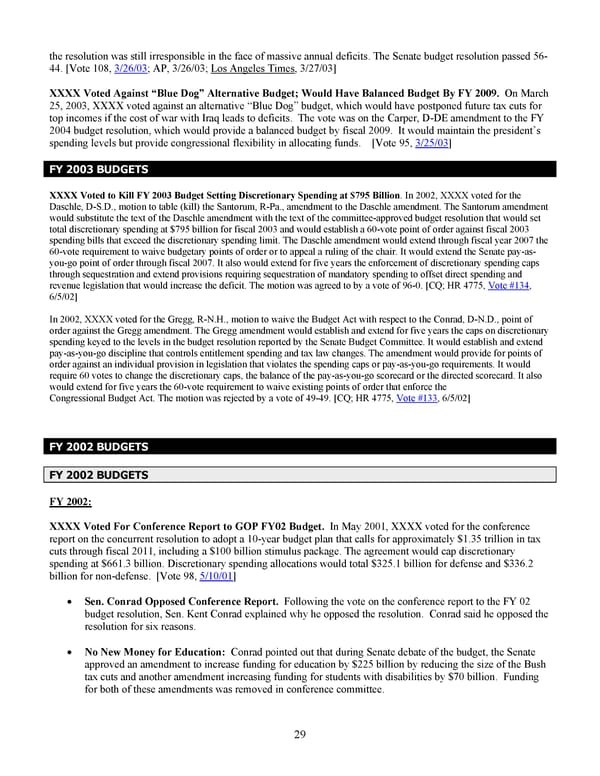the resolution was still irresponsible in the face of massive annual deficits. The Senate budget resolution passed 56- 44. [Vote 108, 3/26/03; AP, 3/26/03; Los Angeles Times, 3/27/03] XXXX Voted Against “Blue Dog” Alternative Budget; Would Have Balanced Budget By FY 2009. On March 25, 2003, XXXX voted against an alternative “Blue Dog” budget, which would have postponed future tax cuts for top incomes if the cost of war with Iraq leads to deficits. The vote was on the Carper, D-DE amendment to the FY 2004 budget resolution, which would provide a balanced budget by fiscal 2009. It would maintain the president’s spending levels but provide congressional flexibility in allocating funds. [Vote 95, 3/25/03] FY 2003 BUDGETS XXXX Voted to Kill FY 2003 Budget Setting Discretionary Spending at $795 Billion. In 2002, XXXX voted for the Daschle, D-S.D., motion to table (kill) the Santorum, R-Pa., amendment to the Daschle amendment. The Santorum amendment would substitute the text of the Daschle amendment with the text of the committee-approved budget resolution that would set total discretionary spending at $795 billion for fiscal 2003 and would establish a 60-vote point of order against fiscal 2003 spending bills that exceed the discretionary spending limit. The Daschle amendment would extend through fiscal year 2007 the 60-vote requirement to waive budgetary points of order or to appeal a ruling of the chair. It would extend the Senate pay-as- you-go point of order through fiscal 2007. It also would extend for five years the enforcement of discretionary spending caps through sequestration and extend provisions requiring sequestration of mandatory spending to offset direct spending and revenue legislation that would increase the deficit. The motion was agreed to by a vote of 96-0. [CQ; HR 4775, Vote #134, 6/5/02] In 2002, XXXX voted for the Gregg, R-N.H., motion to waive the Budget Act with respect to the Conrad, D-N.D., point of order against the Gregg amendment. The Gregg amendment would establish and extend for five years the caps on discretionary spending keyed to the levels in the budget resolution reported by the Senate Budget Committee. It would establish and extend pay-as-you-go discipline that controls entitlement spending and tax law changes. The amendment would provide for points of order against an individual provision in legislation that violates the spending caps or pay-as-you-go requirements. It would require 60 votes to change the discretionary caps, the balance of the pay-as-you-go scorecard or the directed scorecard. It also would extend for five years the 60-vote requirement to waive existing points of order that enforce the Congressional Budget Act. The motion was rejected by a vote of 49-49. [CQ; HR 4775, Vote #133, 6/5/02] FY 2002 BUDGETS FY 2002 BUDGETS FY 2002: XXXX Voted For Conference Report to GOP FY02 Budget. In May 2001, XXXX voted for the conference report on the concurrent resolution to adopt a 10-year budget plan that calls for approximately $1.35 trillion in tax cuts through fiscal 2011, including a $100 billion stimulus package. The agreement would cap discretionary spending at $661.3 billion. Discretionary spending allocations would total $325.1 billion for defense and $336.2 billion for non-defense. [Vote 98, 5/10/01] Sen. Conrad Opposed Conference Report. Following the vote on the conference report to the FY 02 budget resolution, Sen. Kent Conrad explained why he opposed the resolution. Conrad said he opposed the resolution for six reasons. No New Money for Education: Conrad pointed out that during Senate debate of the budget, the Senate approved an amendment to increase funding for education by $225 billion by reducing the size of the Bush tax cuts and another amendment increasing funding for students with disabilities by $70 billion. Funding for both of these amendments was removed in conference committee. 29
 HRC vote skeleton Page 33 Page 35
HRC vote skeleton Page 33 Page 35